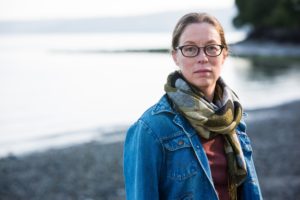
As part of National Public Lands Day Lopez Island presents Day for the Bay. This year’s focus is the Migratory Birds Centennnial. In conjunction with the centennial, COASST, San Juan County Land Bank, KWIAHT, San Juan Islands National Monument and the Lopez Island Library proudly host Executive Director of the Coastal Observation & Seabird Survey Team Julia K. Parrish.
In 2009, thousands of Surf Scoters washed ashore along the outer coast of Washington. In 2014, tens of thousands of Cassin’s Auklets littered beaches from Haida Gwaii in British Columbia south to Newport, Oregon. In 2015, hundreds of thousands of beach-cast Common Murres were found from California north to the Gulf of Alaska. And in 2016, thousands of Rhinoceros Auklets died in the Salish Sea. Is the coastal ecosystem collapsing?
In fact, how likely is it that you will find a beached bird on your favorite beach? And if you do, is that unusual? What killed it? Should you worry? Julia Parrish wondered all of those questions almost 20 years ago when she created the Coastal Observation and Seabird Survey Team, or COASST. Stretching from Mendocino north to Kotzebue, COASST is now the largest beached bird program in the world any way you measure it. With more than 75,000 birds found and counting, COASSTers discover the patterns that define normal annual signals – the pulse of exhausted breeders and lost chicks after the breeding season, the pulse of over-wintering migrants caught in the first storms of Fall the natural history of dead birds. And with this almanac, COASST data have been used to assess the impacts of a changing climate, document harmful algal blooms, measure fishery interactions, monitor for avian influenza, and help understand how ancient coastal peoples survived.
Bio:
Julia K. Parrish is a Lowell A. and Frankie L. Wakefield Professor of Ocean Fishery Sciences, and the Associate Dean of the College of the Environment, at the University of Washington. She is also the Executive Director of the Coastal Observation and Seabird Survey Team (COASST), a citizen science program involving over 800 participants collecting monthly data on the identity and abundance of beach-cast birds, with the goal of creating the definitive baseline against which the impacts of any near-shore catastrophe, from an oil spill to an algal bloom, could be measured. Most recently, she has turned her attention to marine debris, and how citizens can document what washes up where and how wildlife is impacted. Julia has been honored as a NOAA Year of the Oceans Environmental Hero, and received a Champions of Change award at The White House, both for her leadership of COASST.